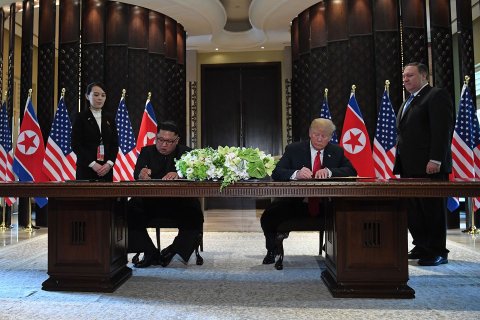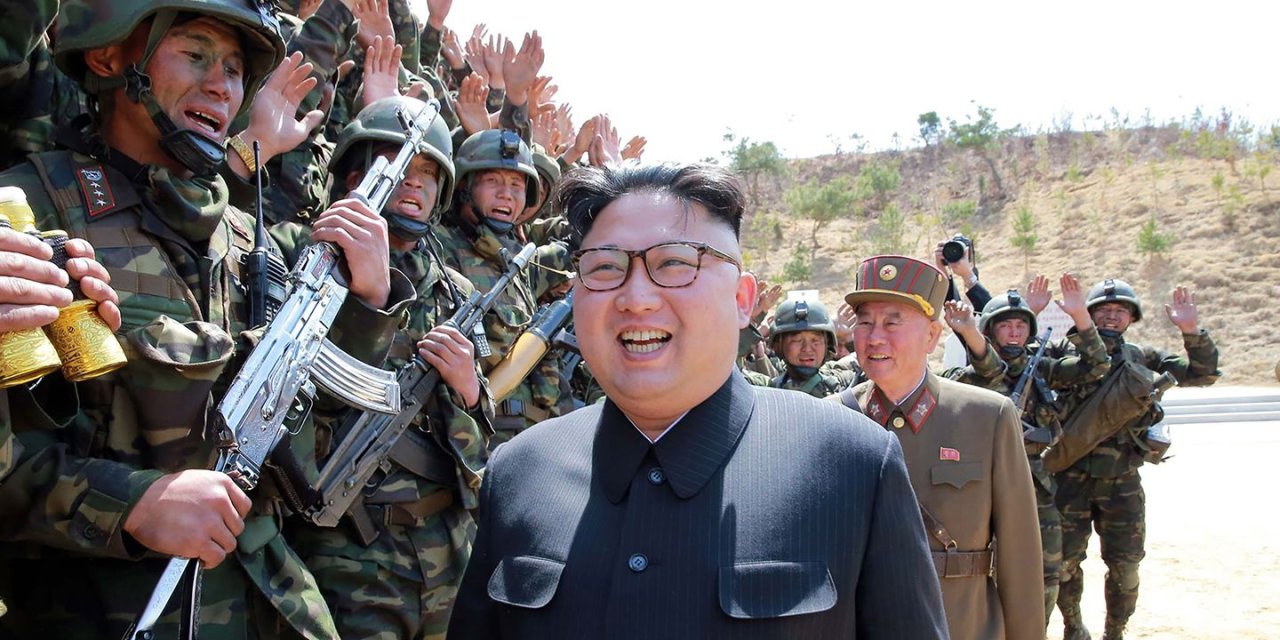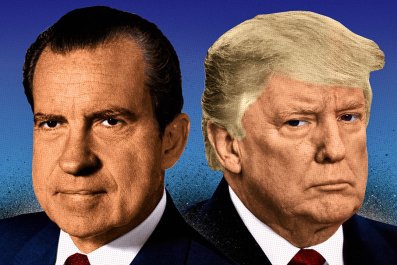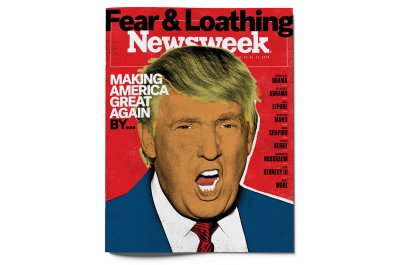For a moment, the South Korean official was silent. It was late December, and, with negotiations between the United States and North Korea at a stalemate, I had asked a straightforward question: What, exactly, does the "denuclearization" of the Korean Peninsula mean? The matter is at the heart of the historic talks Donald Trump and Kim Jong Un began in Singapore last June. The South Korean official, a senior adviser to President Moon Jae-in, let out a deep sigh. "There is no consensus," the official said, "not between us and the U.S., not between North Korea and the U.S.; not, frankly, even within our own government."
That answer is the principal reason why the once-thawing relations between the two sides now seem to be getting colder. Trump, of course, had famously declared the nuclear crisis "largely solved" after last summer's summit. But in November, as talks stalled, the North Koreans canceled a planned meeting between U.S. Secretary of State Mike Pompeo and the North's chief nuclear negotiator, Kim Yong Chol. Just over a month later, on December 16, as the U.S. increased sanctions, Pyongyang's Foreign Ministry fired a warning shot: The added economic pressure, it said, could be America's "greatest miscalculation," potentially blocking a deal "forever—a result desired by no one."
To skeptics of the rapprochement that the president set after with typical fanfare, the diplomatic deadlock was all too predictable. The path toward denuclearization was always going to be vastly more complicated than the Trump administration has publicly acknowledged.

Start with Washington's opening position: The U.S. insists that the North must first comply with what it calls "complete, verifiable and irreversible dismantlement" of its nuclear program. That begins with a declaration of all the work the North has done on its nuke program, and all the material the nation has used in pursuing it. Then—and only then—would the North begin to see the benefits it seeks, including the end of economic sanctions, which could trigger huge investments from South Korea, China, Japan and the U.S., and a formal end to the Korean War, as well as diplomatic recognition from Washington. From Pyongyang's perspective, these demands are not just unrealistic—they are ludicrous. "To North Korea, it's a request that they unilaterally disarm before anything else happens, and that's just not something that they can do," says the South Korean presidential adviser.
Washington points to historic examples of countries willingly and openly standing down their nuclear programs: South Africa after it democratized and Ukraine after the dissolution of the Soviet Union. If you do that, the U.S. has told the North, the money will begin to flow.
That position ignores the extraordinary level of mistrust between the Kim regime and the U.S., say current and former diplomats who have dealt with Pyongyang. Consider what the North means when it talks about denuclearizing the Korean Peninsula. Yes, it wants the South removed from the U.S. nuclear umbrella—the air and seaborne weapons standing ready to defend Seoul and other East Asian allies—but its sights go much further. U.S. diplomats and intelligence officials have learned to their chagrin that the North Korean government apparently believes—incorrectly—that the U.S. still maintains a secret stash of nuclear weapons in the South. In a December 20 statement, Pyongyang said the U.S. "must study geography." The Korean Peninsula, it said, "includes the territory of our republic and also the entire region of South Korea where the United States has placed its invasive force, including nuclear weapons."
The U.S. removed all tactical nukes from the South in the early 1990s, but the North's claim is in line with domestic propaganda the North uses to demonize the U.S. Pyongyang claims America started the Korean War in 1950 by invading the North; in fact, Kim Il Sung, Kim Jong Un's grandfather, invaded the South. It says the U.S. seeks to keep Korea permanently divided and stands poised to attack the North at any moment. The standard assumption among many foreign policy analysts is that the leadership simply uses these claims to justify its own spending on the military in the face of widespread poverty.
But that doesn't mean that in private discussions with outsiders—including U.S. or South Korean diplomats—the North simply waves away the outlandish claims as useful propaganda. Far from it. As Kim Sung-hak, a South Korean scholar who has extensively studied North Korean propaganda, puts it, "they tend to believe what they say publicly. It's in the fabric of their DNA."
Does that mean Kim himself actually believes the U.S. is hiding secret nukes in the South? Diplomats say that's not clear. But a U.S. official not authorized to speak publicly about talks with North Korea adds that some of Kim's military advisers "may well" hold the conviction. And that's a problem. The U.S. side envisions a denuclearization process in the North that will require international inspections and 24-hour monitoring of Pyongyang's nuclear sites until all are satisfied that nothing is left hidden. What if the North also requests the inspection of U.S. and South Korean military bases in the South, to ensure that in fact there are no nukes there?
The subject has yet to come up in the meetings Pompeo has had with the North (and there is zero chance Washington and Seoul would agree to those terms). But just the prospect that it could speaks to the tenuous nature of the diplomacy. In its December 16 statement, the North Korean Foreign Ministry said relations now need to be "improved step by step," with a "priority" on "confidence-building measures." It pointedly blamed Pompeo for making unrealistic demands and tried to appeal to Trump, who "avails himself of every possible occasion to state his willingness to improve" relations.
That's a bit of an exaggeration, but it is true that Trump, as he seeks re-election in 2020, would love to tout a successful "deal" with Kim. The irony is that there are people in Pompeo's State Department who agree with their North Korean counterparts: that the best way to proceed now is with more confidence-building measures, beyond the North's wary pause of its missile testing program and the U.S.'s temporary suspension of some military exercises with Seoul. They privately view the administration's public position—that the North reach full denuclearization by 2021—as an unreachable goal.
The diplomatic small ball could start with person-to-person contacts between technical personnel in North Korea and counterparts from the U.S., the International Atomic Energy Agency and possibly other countries. To build up a measure of goodwill, they could work toward applying the IAEA's nuclear safety measures at nuclear sites in the North. Perhaps Washington and Seoul could allow a small amount of South Korean investment to flow sooner rather than later in return for concrete steps from the North to begin denuclearization. And they could try to figure out a way to assuage the North's fears about a secret nuclear stash.
To many North Korea watchers, those are the type of steps the United States could take if it were serious about getting the North to disarm eventually. For now, the prospect of the opposite seems more likely: the North turning away, revealing Trump's summit with Kim last June to be little more than a publicity stunt.













